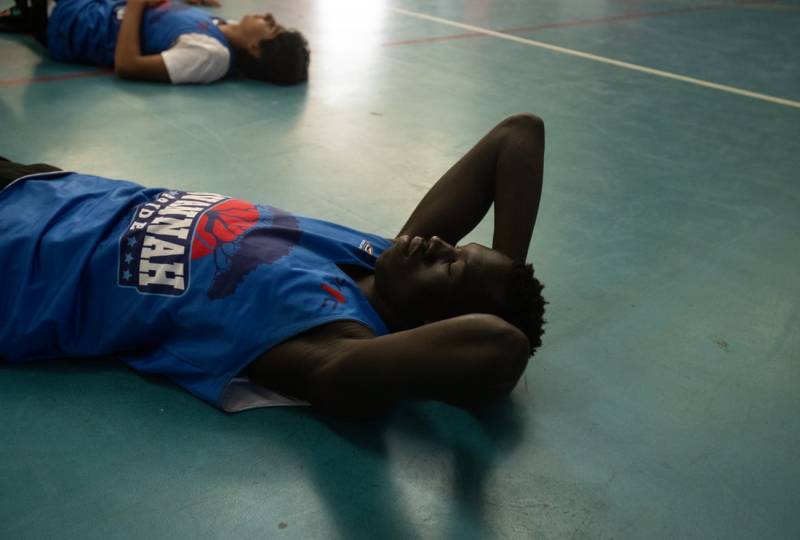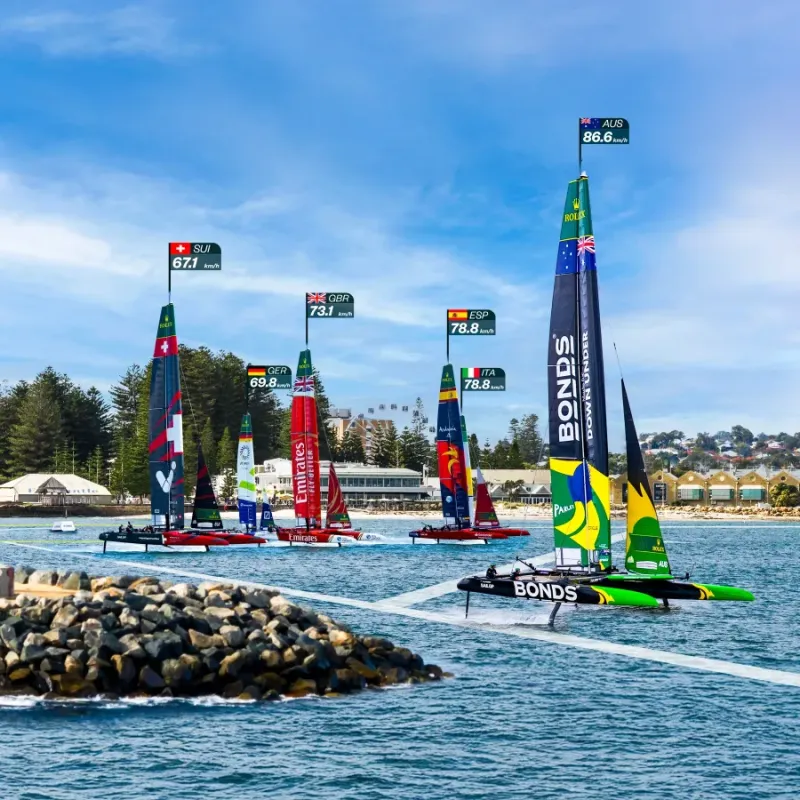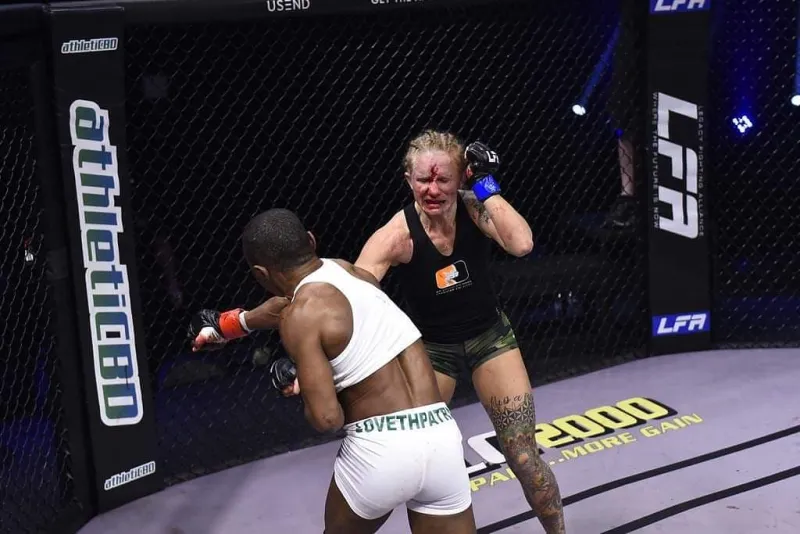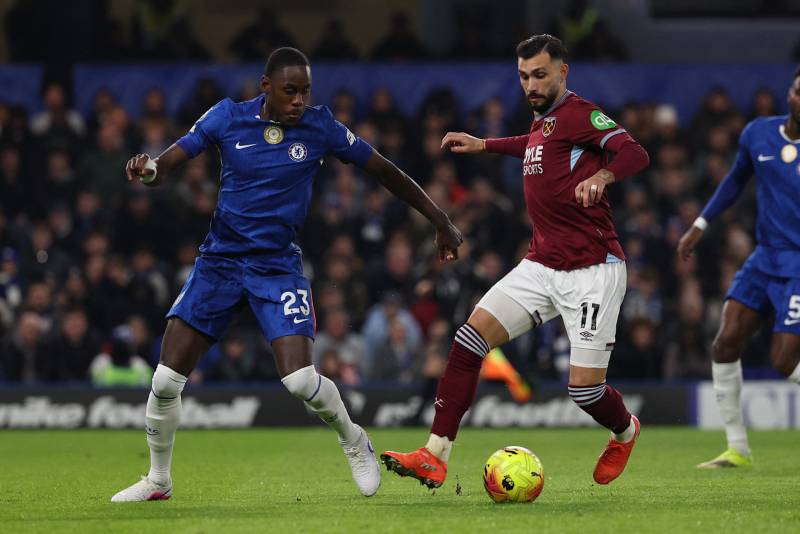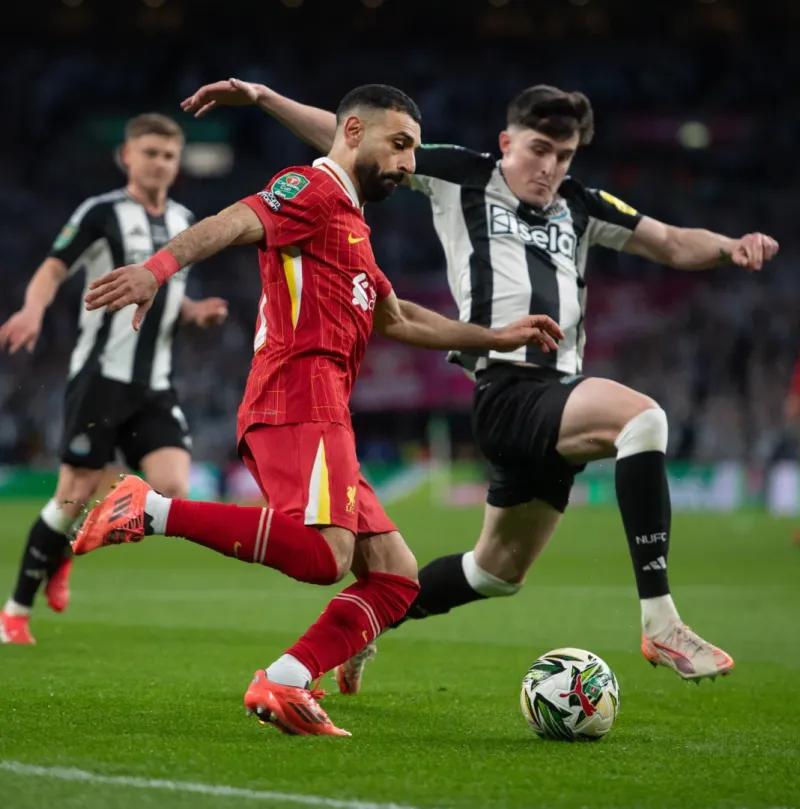Boys are running in rows of three down the court. Legs, shouts, the smack of bouncing balls. As one boy passes to another, the third fans out to take the next pass, then he leaps and dunks. Some boys are already in flight and soaring towards the basket when they take the ball, almost delicately, then slam it through the hoop.
On the side a man in a blue tracksuit watches intently, but not so much that he fails to see a boy trying to slip unnoticed into the gym, a hard thing to do when you are 200cm tall.
“Akuei!” Mayor Chagai calls out. “Why are you late?”
The boy, hands in the pockets of his black tracksuit pants, looks uneasy. He missed a train connection at Granville, he mumbles.
“You’re coming from Campbelltown? What time did you leave?”
“Ten-thirty,” says the boy. That is four-and-a-half hours ago. To be fair, Campbelltown is almost 50km from here, but Chagai is not satisfied: “Why didn’t you leave at 8?”
Akuei shrugs, looks down, and says quietly: “Mum was at work.”
“And you had to look after the kids, right?” Chagai’s tone softens. “All right.” But then: “Why didn’t you text me? You text next time you’re going to be late. OK, jump in.”
I wanted him to explain to me what was going on
A lone basketball.
Akuei enters the line, waiting to join the boys flowing in waves down the court.
“I wanted him to explain to me what was going on,” Chagai, the founder of the Savannah Pride basketball club, says. “If he gets a job and turns up late, then doesn’t communicate to the boss why he’s late, then he won’t have that job.”
Chagai, who left his village in South Sudan at the age of seven and wandered across three countries before arriving in Sydney in 2006 as a 22-year-old refugee, wants to teach his players not only how to dribble and dunk a ball but how to study and work and take their place in society. He is trying to develop not just good basketballers, but fine human beings.
The story unfolding in this spare gymnasium in Blacktown, a western Sydney municipality that contains some of Australia’s most disadvantaged urban areas, is about more than sport. It is about how a community and a country are built.
Singh, Smith and Jones
Start with map and compass in George Street, in the Sydney CBD. Head 30km west and a little north, upriver. At Parramatta, strike west for another 10km, up a hill or two, down another. When you reach the heart of a wide open plain, nearer to the Blue Mountains than the sea, you’re in Blacktown.
It’s not a journey that many Sydneysiders who live closer to the sea ever make. Which is a shame, because the joke that journalist Joanne Vella remembers being made in the newsroom of The Blacktown Advocate might well be true: “You haven’t been to Australia till you’ve been to Blacktown.”
More than 4 million people have arrived in Australia in the past 25 years. Most newcomers have moved to the big cities, but few have moved into the inner cities, which have become gentrified, increasingly monocultural, and locked up by prohibitive housing prices. Instead, recent migrants have had to look to the urban fringe.
As a result, an unprecedented transformation of Australia’s population has occurred out of sight of policymakers, captains of industry, arts and culture leaders, academics and journalists.
This century Blacktown has received three main streams of migrants: refugees from South Sudan, Bhutan and Afghanistan, among other places; people of Pacific Island background and Māori; and migrants coming on skilled visas, mainly from the Indian subcontinent.
The largest overseas-born groups today are the nearly 26,000 residents born in India – Blacktown’s most common surname in 2015 was Singh, followed by Smith and Jones – and 22,000 in the Philippines. Blacktown also has more people born in South Sudan than any other municipality in Australia.
These migrants followed other waves of migrants since the second world war: first the British and Irish, then other Europeans, including Italians, Hungarians, Poles and Maltese, the last of whom came, in many cases, to work in the market gardens on the city’s edge.
Blacktown also contains Australia’s largest urban Indigenous population, of about 10,000 people. It includes members of the original Darug people, but most Indigenous residents moved to Blacktown from regional New South Wales after 1960.
Blacktown’s population of nearly 400,000 numbers about 180 different national backgrounds, with more than 40% of people born overseas. As late as the 1950s the municipality was mainly countryside. That means nearly everyone, apart from the Darug, is in one way or another a recent migrant.
From the savannah to the US and Sydney
It is Saturday afternoon at the Police Citizens Youth Club in the Blacktown suburb of Shalvey. The under-18 squad of the Savannah Pride basketball club has been training for 15 minutes, but Chagai – or “coach,” as players call him – has been taking training sessions since five in the morning. All Saturday and on weeknights he trains groups from under-12 to open age – about 250 players in all, including 20 girls.
The players are mostly South Sudanese, but there are also Islanders, Lebanese, Chinese, Serbians, Italians and Anglos. One white boy from the Central Coast played just one game against Savannah Pride, in which his team was smashed. He was so impressed that he asked Chagai if he could join, and now makes the two-hour journey to Shalvey every weekend to train.
Chagai keeps all his players’ numbers in his phone, and often those of their parents, too. Savannah Pride runs a homework club (suspended during the pandemic) and Chagai gets parents to send him school reports. Any student suspended from school is temporarily banned from games against other clubs. But if a player overdoses and ends up in hospital, or does something that lands him in a police cell, Chagai will turn up to take him home.
This club in western Sydney has caught the eye of the basketball world. American scouts have swooped on Savannah Pride, recruiting 23 of its players to play college and high school basketball in the United States. Duop Reath, who represented Australia at the Tokyo Olympics, played for a time with Savannah Pride. Chagai has featured in The New York Times and on the ABC’s Australian Story, and is the subject of a planned movie. Joe Mantegna, head coach of Blair Academy, a basketball boarding school in New Jersey, has said that Savannah Pride is “impacting more people than most of us ever do in a lifetime”.
Over two Saturdays at the Shalvey PCYC gym, Chagai tells me a little of his long journey from the savannah of Africa to the streets of Sydney. As he speaks of the friends he lost along the way he seems to be carrying sorrow, but when he talks about the game he loves, his face lights up, almost grows mischievous. He has two sides, but they come from the same place.
Sport, he says, must be fun, or young people will not play. Even more importantly, players who enjoy the game can learn to take risks and believe in themselves. The best players are great, Chagai says, not because they have skills or fitness, but because they make good decisions, free of fear.
Chagai wants his players to play instinctively, to trust themselves and their teammates. Confidence in the game can lead to confidence in work and in life. He learned all this, he says, in his journey through Africa, as a refugee.
The end of a dream
At the age of seven, Chagai left his South Sudanese village, where his family herded cattle. Over the next 15 years he trekked to Ethiopia, then to the world’s biggest refugee camp, Kakuma in Kenya, then back to South Sudan as a child soldier for the Sudanese People’s Liberation Army.
He left his village with a cousin to avoid war but war followed him. Bombs fell and battles exploded around him and his companions. Many died of illness or hunger, drowned, or were eaten by wild animals.
“Nearly all the people I knew at that time are dead,” he says. “No food, no sleep, hide in the swamp, dig the roots of plants to eat. No day, no night, all time was the same. Someone can be walking around and in the next few minutes, dead. As long as you breathe, that’s all you know.”
SOURCE : guardian
